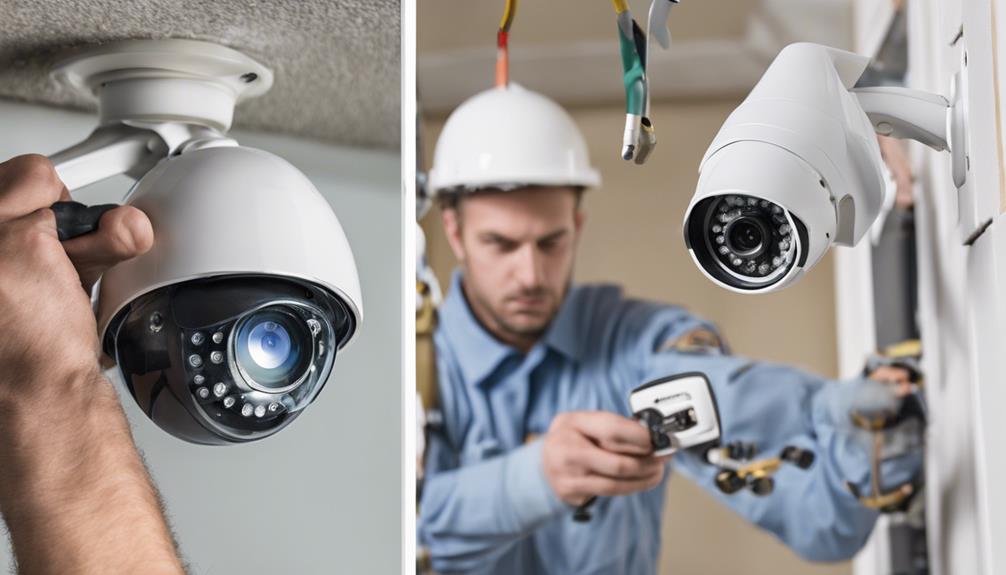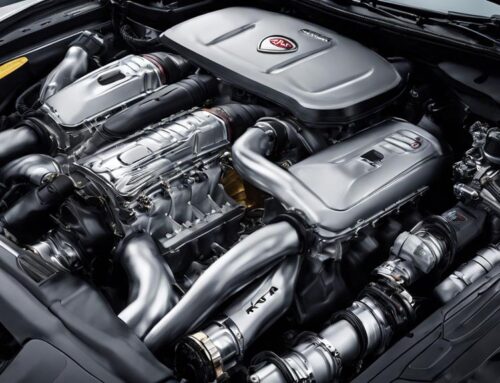Deciding between DIY and professional security system installation depends on your budget, technical comfort, and time availability. DIY systems are cheaper upfront, empowering you to set up on your schedule, but they require a willingness to learn and manage ongoing maintenance. Professional installations, although pricier, offer expert precision, ongoing support, and peace of mind. Think about your readiness to handle technical tasks and your need for reliable protection. Whether you value immediate savings or long-term assurance, knowing more about each option can guide you to the right choice.
Key Takeaways
- DIY systems offer lower upfront costs and no ongoing fees, ideal for budget-conscious users comfortable with technology.
- Professional installation guarantees proper setup, efficiency, and access to expert maintenance, providing peace of mind.
- DIY requires basic tools and technical skills, while professional services save time and reduce the risk of installation errors.
- Professional installations ensure high-quality setup and reliability, crucial for complex security needs and thorough coverage.
- Consider your budget, technical comfort, time availability, and urgency to determine the best installation method for your security goals.
Cost Comparison
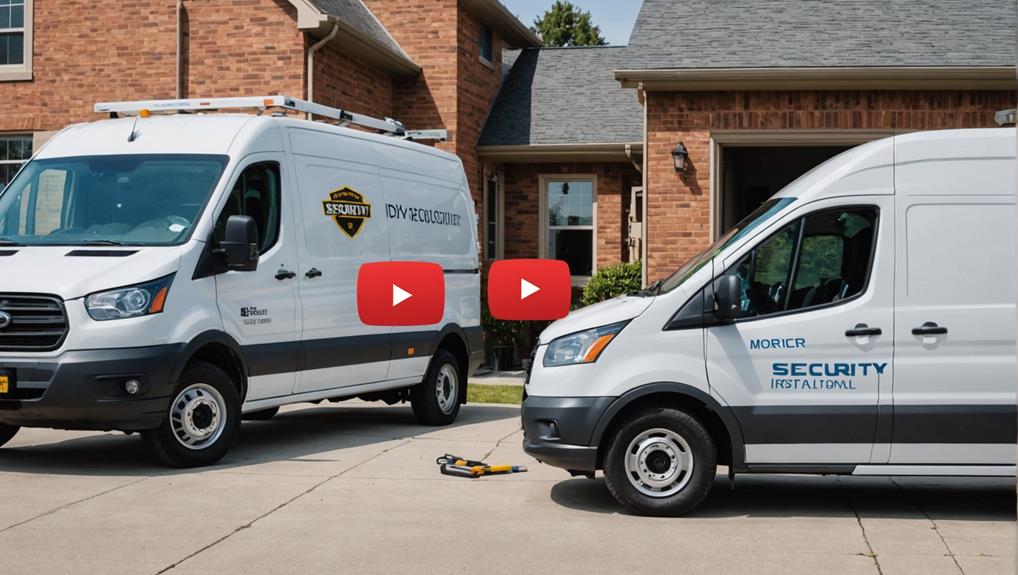
How do the costs of DIY and professional security system installations stack up? If you're looking to serve others by ensuring their homes are safe, understanding this cost comparison is essential.
With DIY security benefits, you'll find that upfront costs are typically lower. You purchase the equipment, often at a fraction of the price of professional setups, and install it yourself. This approach can save on labor fees, and you'll gain the satisfaction of knowing you've personally contributed to someone's safety.
Additionally, DIY setups generally have fewer long-term expenses, as you won't be tied into ongoing contracts or service fees that can accumulate over time. For a detailed analysis of these expenses, you can explore cost insights available online.
On the other hand, professional security installation comes with its own advantages, albeit at a higher cost. When experts handle the setup, you're paying for their experience and precision, which can be invaluable for more complex systems.
Additionally, professional services often include ongoing maintenance and monitoring, ensuring the system remains reliable over time. This can provide peace of mind, particularly for those you're helping who may not feel confident managing the technology themselves.
In a cost comparison, DIY options often win on initial expenses, while professional installations offer long-term value through maintenance and expertise. Choose the option that best aligns with your mission to protect and serve others effectively.
Installation Process
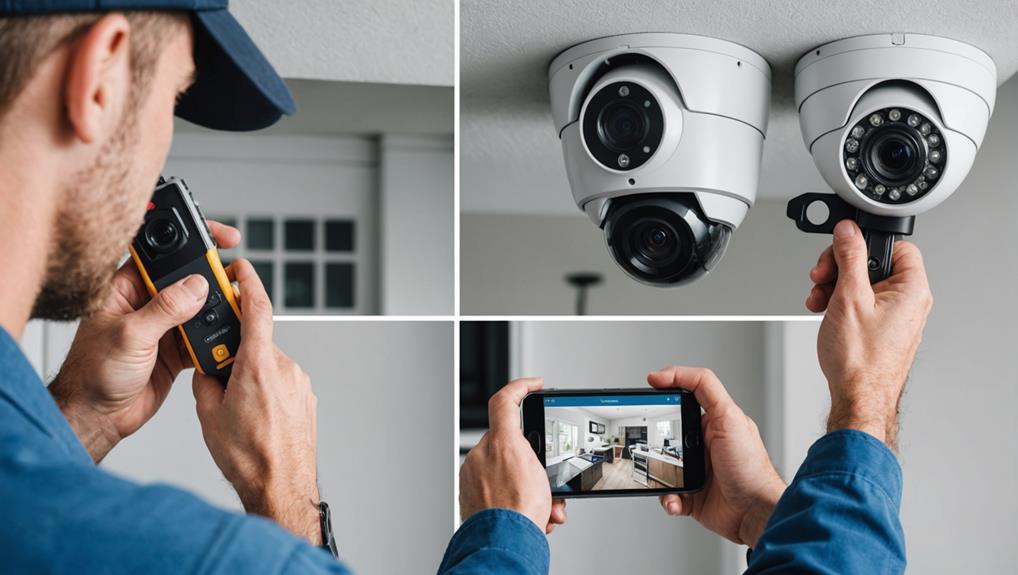
When considering the installation process, you'll need to think about the tools and skills required.
For many, the allure of a DIY option comes from the potential cost savings and the satisfaction of completing a project on their own. However, DIY options can demand significant time and effort, and there's always a risk of making installation errors.
On the other hand, professional installation aims to guarantee everything is set up correctly and efficiently.
Required Tools and Skills
Installing a security system, whether DIY or professionally done, requires a clear understanding of the necessary tools and skills. When you consider the diy vs professional installation options, think about your comfort level with tasks like drilling, wiring, and using power tools.
For a DIY home security setup, you'll need basic tools such as a drill, screwdriver, wire stripper, and possibly a ladder. Additionally, you should have some familiarity with technology for configuring sensors, cameras, and the control panel.
If you're adept at following detailed instructions and have a knack for troubleshooting, installing security systems on your own can be a rewarding project. However, remember that DIY installations might lack the polish and reliability of a professional job.
Professional installers bring specialized tools and extensive experience, ensuring that every component is placed efficiently and functions seamlessly. They also understand the intricacies of home security systems, from advanced wiring techniques to integrating smart home features.
Ultimately, your decision hinges on your skill set and willingness to invest time in learning and executing the installation. Choosing a professional service can save you the hassle and guarantee a high-quality, secure setup tailored to your home.
Time and Effort
Taking into account the tools and skills required, it's also important to evaluate the time and effort involved in the installation process.
If you're passionate about serving others, you'll want to reflect on how much time you can dedicate to installing a security system. Opting for a DIY installation means you'll spend time researching, purchasing, and setting up the equipment. This could take several hours or even an entire weekend, depending on the complexity of the system and your familiarity with the technology.
On the other hand, choosing a professional installation method can save you valuable time, allowing you to focus on other tasks or spend more time helping those who need you.
Professional installers are trained and efficient, often completing the job within a few hours. This guarantees that your security system is up and running quickly, without requiring a significant time investment from you.
Potential Installation Errors
Errors can greatly impact the effectiveness of your security system. When installing a DIY security system, you might run into several pitfalls that could leave your home vulnerable.
It's essential to be aware of the common installation errors that can occur.
- Incorrect Sensor Placement: Placing sensors too far from entry points or in areas with poor signal can render them ineffective.
- Improper Camera Angles: Cameras need to be positioned correctly to cover all necessary areas. A misaligned camera might miss vital activity.
- Weak Network Connection: A weak Wi-Fi signal can cause cameras and sensors to drop offline, leaving gaps in your security coverage.
- Inadequate Power Supply: If devices aren't properly powered, they may not function as intended, putting your home at risk.
Technical Expertise
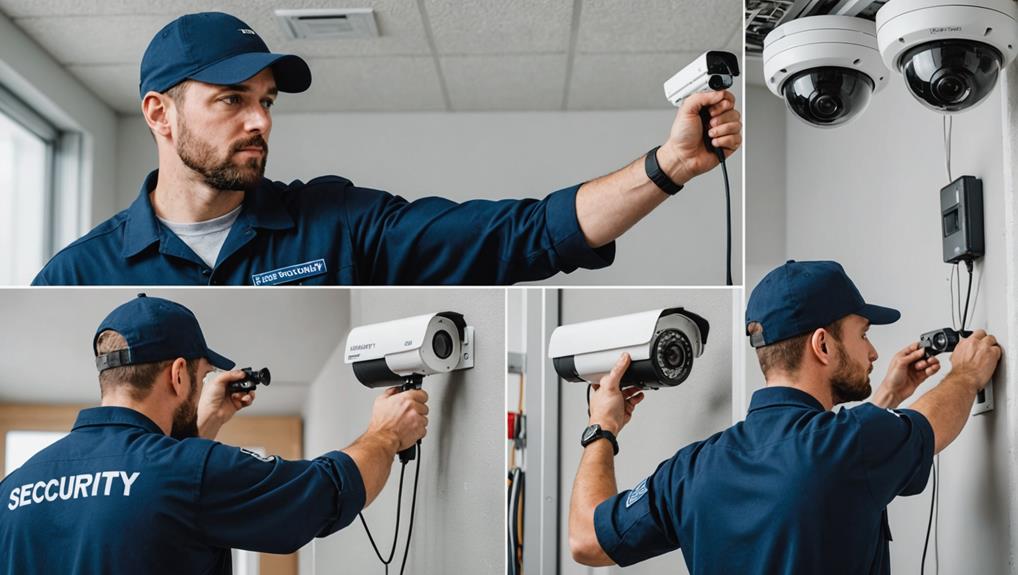
When it comes to technical expertise, a DIY security system installation often demands a hands-on understanding of various technologies and tools.
You'll need to be comfortable working with gadgets, wiring, and possibly even computer networks. It's not just about placing cameras; you might've to troubleshoot connectivity issues or configure software settings. If you enjoy solving tech-related problems and have the time to learn, a DIY approach could be rewarding.
However, let's face it, not everyone has the technical know-how or the patience to engage in such detailed work.
If you're someone who prefers to spend your time directly helping others rather than wrestling with technical challenges, a professional installation might be the better choice. Professionals bring a wealth of experience and can guarantee that the system is set up correctly and efficiently, freeing you to focus on what you do best—serving others.
Consider your comfort level with technology.
If you're confident in your skills, DIY can save you money and give you a sense of accomplishment. But if you'd rather avoid potential headaches and make sure everything works seamlessly, professional installation offers peace of mind.
System Customization
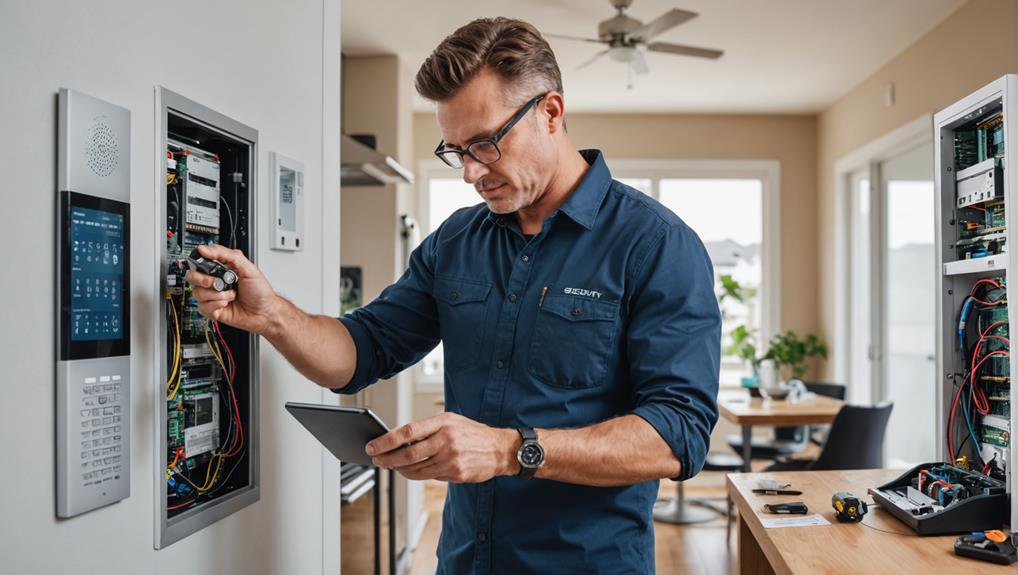
System customization is a crucial aspect of any security setup, allowing you to tailor the features to meet your specific needs. When you're focused on serving others, either at home or in a community setting, flexibility in your security system can make a world of difference.
Customizing your system guarantees it aligns perfectly with your unique requirements and priorities. According to a comparative analysis of DIY and professionally installed security systems, the ability to customize has significant implications for both convenience and effectiveness.
When you choose a DIY security system, you get the freedom to pick and place devices exactly where you need them without waiting for a technician. This is particularly useful if you have special considerations or changing needs over time.
On the other hand, professional installation often comes with expert advice, guaranteeing your system is designed efficiently from the get-go.
Consider these customization options:
- Sensor Placement: Choose where to install door, window, and motion sensors for ideal coverage.
- Camera Types: Select from indoor, outdoor, and doorbell cameras to monitor various areas.
- Alert Preferences: Set up notifications via text, email, or app alerts based on your preferences.
- Integration: Integrate with other smart home devices for a cohesive and automated experience.
Ultimately, whether you go DIY or professional, the key is to create a system that best serves your security and peace of mind.
Maintenance Needs
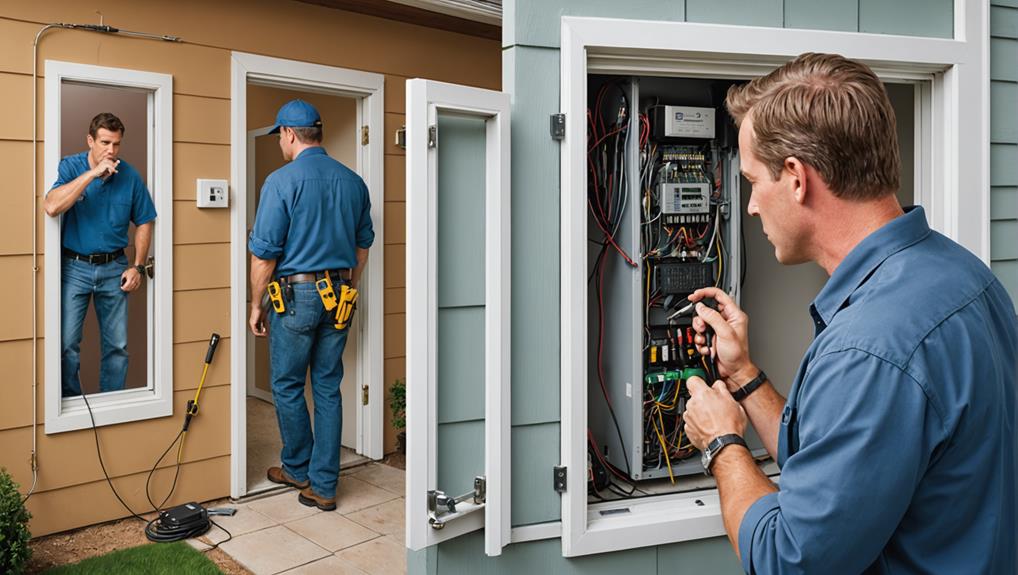
While customization guarantees your security system meets your unique needs, ongoing maintenance is equally important to keep everything running smoothly. With a DIY security system, you're responsible for regular upkeep. This means checking batteries, updating software, and troubleshooting any issues that arise. It can be time-consuming, but if you enjoy hands-on tasks and have the time, it's a manageable option.
However, it's essential to take into account the initial setup and equipment costs that come with a DIY system, which can vary based on the components you choose.
On the other hand, professional security systems often come with maintenance packages. This means a trained technician will handle routine checks and necessary updates. You won't have to worry about the little details, allowing you to focus on other ways to serve and protect your loved ones.
Additionally, professionals can quickly identify and fix potential problems before they become major issues.
Choosing between DIY and professional installation ultimately depends on your willingness to commit time to maintenance. If you're someone who enjoys taking a proactive role, DIY might suit you.
However, if you prefer the peace of mind that comes with knowing experts are maintaining your system, a professional installation is likely the better choice. Both options have their merits, but ensuring your security system remains effective is what matters most.
Reliability and Support
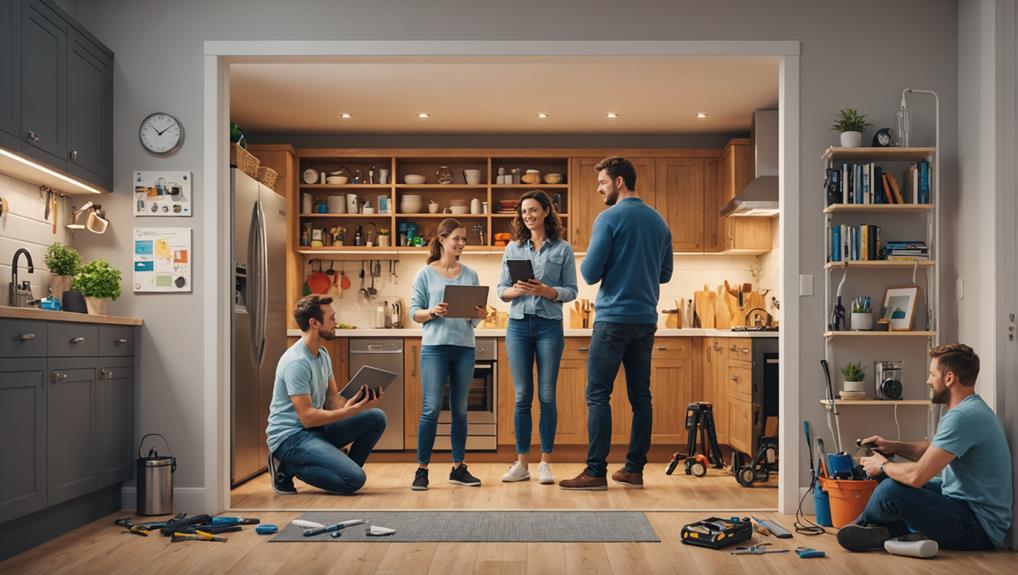
When it comes to reliability and support, a professionally installed security system often guarantees consistent performance.
This level of reliability is particularly vital for homes in high-risk areas where technical issues could have severe consequences.
You'll also benefit from 24/7 technical assistance, meaning help is always available when you need it.
In contrast, DIY systems might leave you handling technical glitches alone.
Consistent System Performance
An essential aspect to contemplate when choosing between DIY and professional security system installation is consistent system performance. You want your security system to be reliable and operate smoothly without frequent disruptions.
DIY systems often rely on your technical skills and understanding. If something goes wrong, you're the one responsible for troubleshooting and fixing the issue, which can be time-consuming and stressful.
In contrast, professional installations come with the assurance of expert setup and configuration. Professionals bring experience and specialized knowledge, ensuring the system is optimized for your specific needs. This often results in fewer hiccups and better overall performance.
Here's a quick comparison to help you decide:
- DIY Systems: You're in charge of installation and maintenance, which can be empowering but also challenging if you're not tech-savvy.
- Professional Systems: Technicians handle installation, likely resulting in a more reliable and efficient setup.
- DIY Systems: Potential cost savings initially but may incur additional costs if issues arise.
- Professional Systems: Higher upfront costs but often more consistent and dependable performance.
24/7 Technical Assistance
Technical assistance plays an essential role in the reliability and support of your security system. Choosing between DIY and professional installation means considering how much help you might need down the line.
If you're the kind of person who thrives on solving problems yourself, DIY systems often come with online resources, forums, and customer support lines. However, keep in mind that response times and assistance quality can vary widely.
On the other hand, professional installations usually come with the benefit of dedicated technical support. This means you'll have experts at your fingertips who can diagnose and resolve issues swiftly. If your goal is to guarantee the safety and well-being of those you serve, having quick and reliable support can be invaluable.
Professionals can offer you peace of mind, knowing your system is optimized and functioning correctly.
While DIY systems might save you money upfront, consider the long-term reliability and support you're likely to need. If any technical issues arise, having a professional team ready to assist can be vital.
Assess your comfort level with troubleshooting and the value you place on professional support to make the best choice for your security needs.
Scalability Options
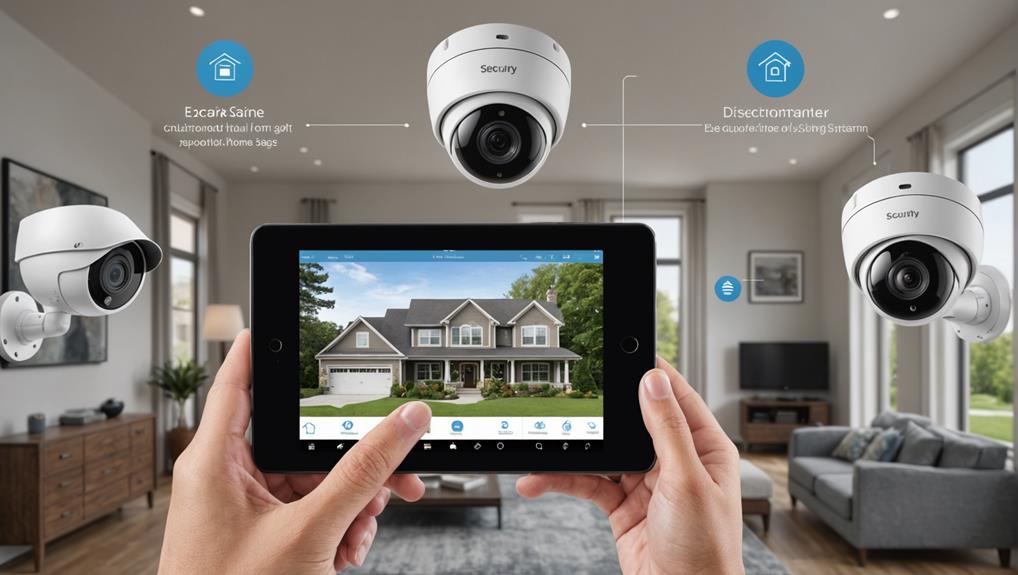
Whether you're securing a modest apartment or a sprawling estate, scalability is an essential factor to take into account in your security system installation. A scalable system can grow with you, adapting to your changing needs without requiring a complete overhaul.
For more insights on choosing the right type of security system, check out our guide on selecting the right type of security system.
If you opt for a DIY security system, you'll likely find flexibility in adding new components as needed. However, be prepared to manage the complexity yourself.
With professional installation, the system is usually designed with scalability in mind from the start. Experts can assess your current needs and anticipate future ones, guaranteeing seamless integration of additional devices.
Consider these points when thinking about scalability:
- Ease of Expansion: DIY systems often allow you to add new sensors or cameras with minimal hassle, but you'll need to verify compatibility.
- Cost: Initial costs might be lower for a DIY setup, but adding more components later can add up.
- Customization: Professional systems offer tailored solutions, making it easier to scale up with sophisticated features.
- Support: With a professional setup, ongoing support guarantees that new additions work flawlessly with your existing system.
Ultimately, your choice will depend on how much control and support you need as your security requirements evolve.
Frequently Asked Questions
How Do DIY and Professional Systems Differ in Terms of User-Friendliness?
DIY systems are often more user-friendly because you install and customize them yourself, letting you understand every detail.
However, professional systems can save you time and hassle, as experts handle the setup and often provide ongoing support.
If you enjoy helping others and ensuring their safety, consider how each option fits your skills and the level of service you want to provide.
Both have their strengths.
Are There Significant Differences in the Types of Sensors Used in DIY vs. Professional Systems?
Yes, you'll find significant differences in the types of sensors used.
DIY systems often come with basic sensors for doors, windows, and motion detection.
Professional systems, however, offer advanced options like glass break sensors, environmental sensors for fire and carbon monoxide, and even video verification.
If you want to guarantee thorough safety for those you're protecting, you might lean towards the professional systems' more sophisticated options.
What Is the Average Lifespan of DIY Security Equipment Compared to Professional Systems?
When considering the average lifespan of DIY security equipment versus professional systems, you'll find that DIY equipment typically lasts around 3-7 years.
Professional systems, however, can last between 10-15 years due to higher-quality materials and expert installation.
By choosing the right system, you're not just securing your home; you're also ensuring peace of mind for those you care about.
How Do DIY and Professional Systems Affect Home Insurance Premiums?
When considering home insurance premiums, both DIY and professional security systems can positively impact your rates.
Insurers often offer discounts for any security measures, but professional systems might give you a bigger break. They're generally seen as more reliable.
If you're committed to keeping others safe, investing in a robust, professionally installed system could be worth it for the enhanced security and potential insurance savings.
Are There Any Privacy Concerns Unique to DIY Security Systems?
Yes, there are privacy concerns unique to DIY security systems.
When you install these systems yourself, you might overlook secure configurations, leaving your data vulnerable. Manufacturers could collect and misuse your personal information.
It's vital to read privacy policies and guarantee you're using strong passwords and encryption. Serving others means protecting their privacy too, so always prioritize security settings and stay informed about potential risks.
Conclusion
In deciding between DIY and professional security system installation, consider your budget, technical skills, and long-term needs. DIY options are often cheaper and customizable but require more effort and know-how. Professional installations cost more but offer expert setup, ongoing support, and reliability. Weigh the pros and cons based on your specific situation. Ultimately, whether you choose DIY or professional, securing your home is the top priority. Make the choice that best fits your lifestyle and peace of mind.

